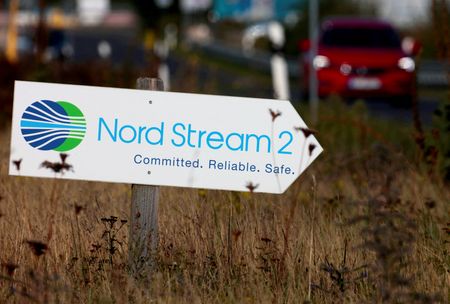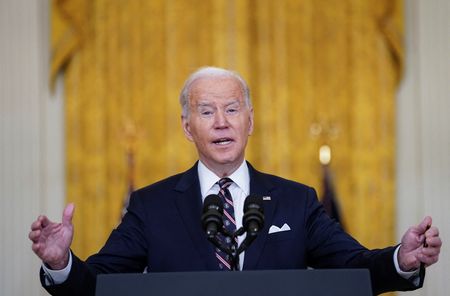 1
1 1
1


By Jeff Mason
WASHINGTON (Reuters) -The United States on Wednesday imposed sanctions on the company in charge of building Russia’s Nord Stream 2 gas pipeline, expanding penalties on Moscow after it recognized two breakaway regions in eastern Ukraine.
The sanctions, which target the Nord Stream 2 AG company and its CEO, Matthias Warnig, add to pressure on the Baltic Sea project that was designed to double the gas flow capacity from Russia to Germany.
Europe’s most divisive energy project, Nord Stream 2 has not begun operations pending certification by Germany and the European Union.
Germany on Tuesday halted the pipeline, worth $11 billion, citing Russia’s actions toward Ukraine. The United States and the EU worry the pipeline will increase Europe’s dependence on Russian energy supplies and deny transit fees to Ukraine, host to another Russian gas pipeline.
In a statement on Wednesday, U.S. President Joe Biden said his administration had been closely coordinating Nord Stream 2 action with Germany, adding: “Today, I have directed my administration to impose sanctions on Nord Stream 2 AG and its corporate officers.”
Biden added: “These steps are another piece of our initial tranche of sanctions in response to Russia’s actions in Ukraine. As I have made clear, we will not hesitate to take further steps if Russia continues to escalate.”
The U.S. Treasury Department issued a general license authorizing the “wind down” of transactions with Nord Stream 2 AG until March 2.
The sanctions did not affect Gerhard Schroeder, a former German chancellor and a close friend of Russian President Vladimir Putin’s who has headed the shareholders committee of Nord Stream since 2005.
Nord Stream 2 AG is a registered Swiss firm whose parent company is the Russian state-owned gas giant Gazprom. Gazprom owns the entire pipeline but paid half the costs, with the rest shared by Shell, Austria’s OMV, France’s Engie and Germany’s Uniper and Wintershall DEA.
(Reporting by Jeff Mason, Kanishka Singh and Daphne Psaledakis; Editing by Doina Chiacu, Chizu Nomiyama and Howard Goller)